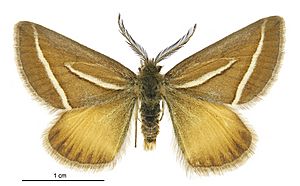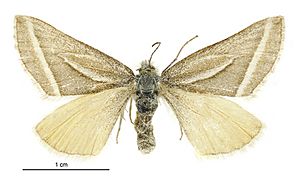Aponotoreas insignis facts for kids
Quick facts for kids Aponotoreas insignis |
|
|---|---|
 |
|
| Male specimen | |
 |
|
| Female specimen | |
| Scientific classification | |
| Synonyms | |
|
The Alpine grassland orange (scientific name: Aponotoreas insignis) is a type of moth. It belongs to the Geometridae family. This special moth can only be found in New Zealand, meaning it is endemic there.
Discovering the Alpine Grassland Orange
This moth was first studied and named by a scientist named Arthur Gardiner Butler in 1877. He looked at moths collected by James Hector and John Davies Enys. Butler first gave it the name Aspilates insignis. Later, in 1986, another scientist named Robin C. Craw created a new group, or genus, called Aponotoreas. He then placed this moth into that new group, giving it its current name, Aponotoreas insignis.
How This Moth Behaves
The Alpine grassland orange moth is a day-flying moth. This means you can see it flying around during the daytime. Adult moths are usually active and flying between January and March each year.
Where It Lives and What It Eats
This moth loves to live in tussock lands. These are areas with tall, clumpy grasses found on the sides of mountains in the South Island of New Zealand. The young moths, called larvae (or caterpillars), eat specific plants. They feed on different types of Chionochloa and Poa grasses.

